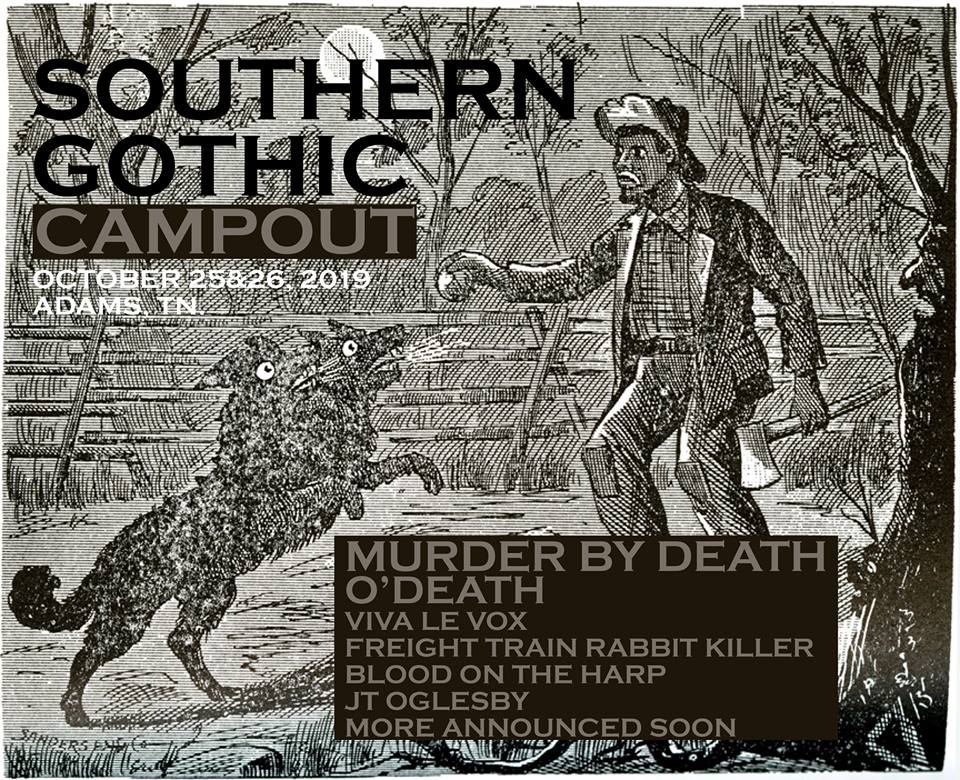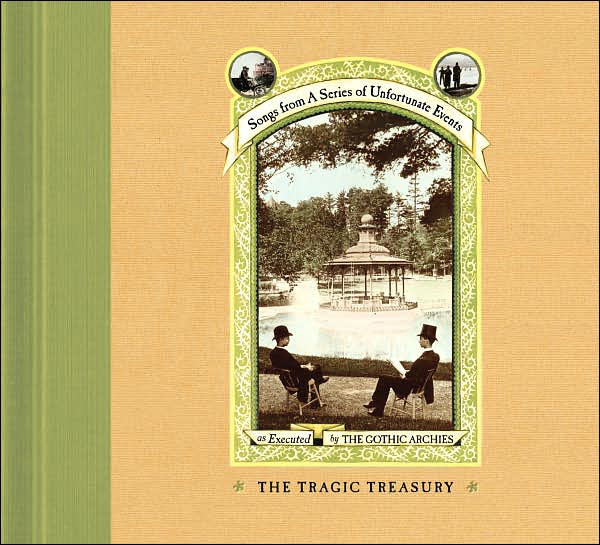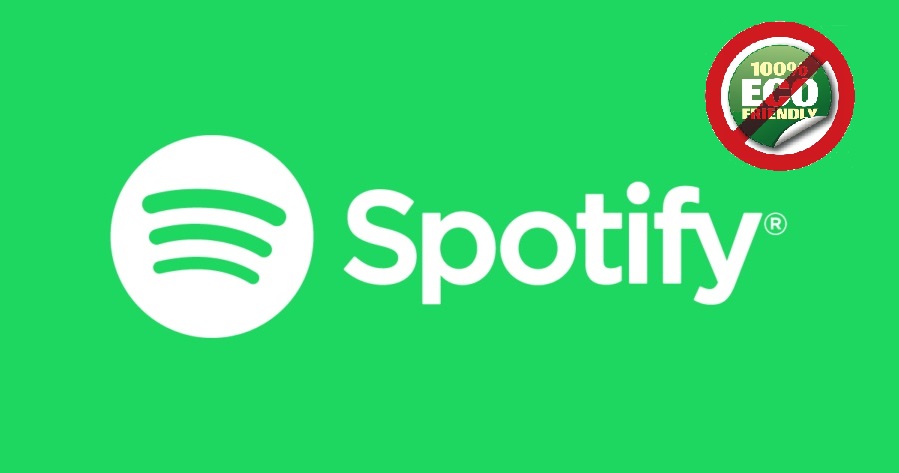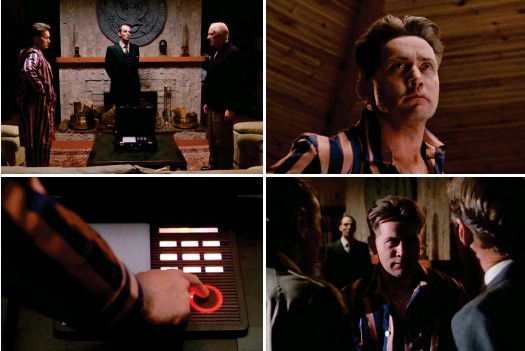 Once is an incident, twice is a trend, thrice is a tradition. Southern Gothic Campout (SGC) is a trend, but hopefully it will turn into a tradition. The dark roots music festival will as before take place in the middle of nowhere in Adams, TN and near the home of the Bell Witch. SGC will surely not beat the Woodstock festival in 1969, which unexpectedly attracted an audience of more than 400 000 people. There's a number of reasons for this prognosis. The most important reason is that tickets are limited to 300. The attendance figure in 2017 was approximately 100. What can I say, the genre attracts a small but dedicated audience. Reportedly it was freezing and pretty remote. Among the bands that performed in 2017 were no less than Those Poor Bastards (evil doom country) and Sons of Perdition (apocalyptic doom country). These bands both fit the "Southern Gothic" bill. But, what about the rest of the bands and artists? The term "Southern Gothic" seems like a misnomer. According to a primary source there were probably three or four acts that could be filed as gothic. And this isn't just the purist point of view. It's an objective fact. The gothic factor seems to be constant this year. But we shouldn't let the best become the enemy of the good. SGC is a great initiative. The main attractions and the bands with the largest fonts on the poster are Murder By Death and O'Death. Other bands are Viva Le Vox, Freight Train Rabbit Killer, Blood on the Harp and JT Oglesby. More bands are to be announced. This event sounds like a lot of fun. But, I will stay home and read about it instead. There's a number of reasons for this damper decision. One reason is that Swedes generally are strangers to camping in late October.
Once is an incident, twice is a trend, thrice is a tradition. Southern Gothic Campout (SGC) is a trend, but hopefully it will turn into a tradition. The dark roots music festival will as before take place in the middle of nowhere in Adams, TN and near the home of the Bell Witch. SGC will surely not beat the Woodstock festival in 1969, which unexpectedly attracted an audience of more than 400 000 people. There's a number of reasons for this prognosis. The most important reason is that tickets are limited to 300. The attendance figure in 2017 was approximately 100. What can I say, the genre attracts a small but dedicated audience. Reportedly it was freezing and pretty remote. Among the bands that performed in 2017 were no less than Those Poor Bastards (evil doom country) and Sons of Perdition (apocalyptic doom country). These bands both fit the "Southern Gothic" bill. But, what about the rest of the bands and artists? The term "Southern Gothic" seems like a misnomer. According to a primary source there were probably three or four acts that could be filed as gothic. And this isn't just the purist point of view. It's an objective fact. The gothic factor seems to be constant this year. But we shouldn't let the best become the enemy of the good. SGC is a great initiative. The main attractions and the bands with the largest fonts on the poster are Murder By Death and O'Death. Other bands are Viva Le Vox, Freight Train Rabbit Killer, Blood on the Harp and JT Oglesby. More bands are to be announced. This event sounds like a lot of fun. But, I will stay home and read about it instead. There's a number of reasons for this damper decision. One reason is that Swedes generally are strangers to camping in late October.
 I'm surprised, thrilled and amused. I thought that I had explored every single branch, twig and leaf in the gothic country music genre. Obviously, I had overlooked "goth-bubblegum". The finest and maybe only example of this sub-genre is "The Gothic Archies" (TGA). The band name is a pun, alluding to the term "Gothic arch" and to the fictional garage band "The Archies". A little bit of humour in the gothic genre won't kill us. TGA was created and largely performed by Stephin Merritt of The Magnetic Fields (indie-pop). TGA got more well-known when Merritt wrote, performed and recorded songs for the audiobook versions of Lemony Snicket's "A Series of Unfortunate Events". For those of you who aren't familiar to this book series, it's Victorian gothic literature for children disguised as children's novels. A collection of thirteen songs based on each book and two additional tracks was released as "The Tragic Treasury" on October 10, 2006, to coincide with the release of the final book in the series. The main thirteen books in the series have collectively sold more than 60 million copies and have been translated into 41 languages. The Gothic Archies briefly toured to promote the album featuring Merritt on ukulele and Daniel Handler (a.k.a. Lemony Snicket) on accordion. In 2002, The Gothic Archies composed original music for the audio book version of Neil Gaiman's Coraline (a dark fantasy children's novella). That's about all there is to say about this novelty act. And the verdict of The Gothic Archies? Not bad. Not bad at all.
I'm surprised, thrilled and amused. I thought that I had explored every single branch, twig and leaf in the gothic country music genre. Obviously, I had overlooked "goth-bubblegum". The finest and maybe only example of this sub-genre is "The Gothic Archies" (TGA). The band name is a pun, alluding to the term "Gothic arch" and to the fictional garage band "The Archies". A little bit of humour in the gothic genre won't kill us. TGA was created and largely performed by Stephin Merritt of The Magnetic Fields (indie-pop). TGA got more well-known when Merritt wrote, performed and recorded songs for the audiobook versions of Lemony Snicket's "A Series of Unfortunate Events". For those of you who aren't familiar to this book series, it's Victorian gothic literature for children disguised as children's novels. A collection of thirteen songs based on each book and two additional tracks was released as "The Tragic Treasury" on October 10, 2006, to coincide with the release of the final book in the series. The main thirteen books in the series have collectively sold more than 60 million copies and have been translated into 41 languages. The Gothic Archies briefly toured to promote the album featuring Merritt on ukulele and Daniel Handler (a.k.a. Lemony Snicket) on accordion. In 2002, The Gothic Archies composed original music for the audio book version of Neil Gaiman's Coraline (a dark fantasy children's novella). That's about all there is to say about this novelty act. And the verdict of The Gothic Archies? Not bad. Not bad at all.
 Outdoor shows has its merits. At least in the summer. The golden age of outdoor shows in Stockholm was in 1975-1977. I know, because I was there. The venue where it all took place was Gröna Lund, an amusement park(!). It's a relatively small park compared to other parks, mainly because of its central location, which effectively limits expansion. The scene area is also small. To name a few bands and artists who performed there in 1975-1977: Alice Cooper, Wishbone Ash, Status Quo, Uriah Heep, Kiss, The Sweet, Lou Reed, The Clash, Eagles and Thin Lizzy. The crappy photo on the left is taken by me on August 10, 1977. Later that night Thin Lizzy entered the stage. It was their second visit to Stockholm in less than a year. On September 30, 1976 they played at the Concert Hall. I had a ticket on the second row. The photo captures the fashion style at the time. Racoon make-up, swinging bangs, jeans (often white in the summer), wind jackets, folkloristic (synthetic) cardigans and, quite shocking, clogs (black or white). I saw a couple of shows in 1975-1977. However, I missed the british glam rock band The Sweet on May 5, 1976. They wrote history. Not only for cancelling two shows in a row (due to rain and risk of electrocution), but for the turmoil and disgust they created. They arrived at hotel Birger Jarl on May 3th after playing a show in Lund. Allegedly, a group of underaged girls were waiting outside the hotel to meet them. However, no indecent "meet and greet" occurred since neither underage girls or alcohol were allowed in the hotel rooms. The hotel was managed by the Mission Covenant Church of Sweden and they had a strict policy. Unsatisfied desires led to disappointment and hostility. Eventually, the staff threw them out. The editor of the magazine Poster (read more here, opens in a new window) intervened and tried to help them out. From a phone boot (yes, kids) he called virtually all hotels in Stockholm. Finally, they found refuge at hotel Malmen. You have to make hard prioirities when you are on a short-stay in Stockholm. The Sweet visited the dubious sex club Sexorama, known for live shows and naked women dangling in dusty nets over the tables, dim lightning and common despair. Things went from bad to worse before the show. During a soundcheck a couple of teenage girls slipped through the security and reached the scene area. This minor incident made guitarist Andy Scott very upset. He punched artist manager Ove Hahn in the face so hard that he fell into the tulip arrangements below the stage (yes, the same flower arrangements that Uriah Heep-singer David Byron fell into, read more here, opens in a new window). When the show was finished the sweet guys topped it off with smearing ketchup on the windows in the dressing room, urinating in the champagne coolers and, last but not least, handing over a turd in a folded tablecloth to manager Ove Hahn as a gift. Ove Hahn was a chastened man (when Jimi Hendrix played his set well overtime in 1967 he simply pulled out the power plug of the amplifier), but even he was shocked and appalled. "In my over 14 years as a manager, I have never experienced something so swinish". The band's manager David Walker tried to pour oil on troubled waters: "We are dealing with young, illiterate scoundrels who have become millionaires in a blink of an eye. They are not human beings, they are animals!". But the story doesn't end there. Legend has it that the band, not unexpectedly, received a complaint letter from Gröna Lund. The Sweet replied by sending a box with feces to the organizer. They were never booked again.
Outdoor shows has its merits. At least in the summer. The golden age of outdoor shows in Stockholm was in 1975-1977. I know, because I was there. The venue where it all took place was Gröna Lund, an amusement park(!). It's a relatively small park compared to other parks, mainly because of its central location, which effectively limits expansion. The scene area is also small. To name a few bands and artists who performed there in 1975-1977: Alice Cooper, Wishbone Ash, Status Quo, Uriah Heep, Kiss, The Sweet, Lou Reed, The Clash, Eagles and Thin Lizzy. The crappy photo on the left is taken by me on August 10, 1977. Later that night Thin Lizzy entered the stage. It was their second visit to Stockholm in less than a year. On September 30, 1976 they played at the Concert Hall. I had a ticket on the second row. The photo captures the fashion style at the time. Racoon make-up, swinging bangs, jeans (often white in the summer), wind jackets, folkloristic (synthetic) cardigans and, quite shocking, clogs (black or white). I saw a couple of shows in 1975-1977. However, I missed the british glam rock band The Sweet on May 5, 1976. They wrote history. Not only for cancelling two shows in a row (due to rain and risk of electrocution), but for the turmoil and disgust they created. They arrived at hotel Birger Jarl on May 3th after playing a show in Lund. Allegedly, a group of underaged girls were waiting outside the hotel to meet them. However, no indecent "meet and greet" occurred since neither underage girls or alcohol were allowed in the hotel rooms. The hotel was managed by the Mission Covenant Church of Sweden and they had a strict policy. Unsatisfied desires led to disappointment and hostility. Eventually, the staff threw them out. The editor of the magazine Poster (read more here, opens in a new window) intervened and tried to help them out. From a phone boot (yes, kids) he called virtually all hotels in Stockholm. Finally, they found refuge at hotel Malmen. You have to make hard prioirities when you are on a short-stay in Stockholm. The Sweet visited the dubious sex club Sexorama, known for live shows and naked women dangling in dusty nets over the tables, dim lightning and common despair. Things went from bad to worse before the show. During a soundcheck a couple of teenage girls slipped through the security and reached the scene area. This minor incident made guitarist Andy Scott very upset. He punched artist manager Ove Hahn in the face so hard that he fell into the tulip arrangements below the stage (yes, the same flower arrangements that Uriah Heep-singer David Byron fell into, read more here, opens in a new window). When the show was finished the sweet guys topped it off with smearing ketchup on the windows in the dressing room, urinating in the champagne coolers and, last but not least, handing over a turd in a folded tablecloth to manager Ove Hahn as a gift. Ove Hahn was a chastened man (when Jimi Hendrix played his set well overtime in 1967 he simply pulled out the power plug of the amplifier), but even he was shocked and appalled. "In my over 14 years as a manager, I have never experienced something so swinish". The band's manager David Walker tried to pour oil on troubled waters: "We are dealing with young, illiterate scoundrels who have become millionaires in a blink of an eye. They are not human beings, they are animals!". But the story doesn't end there. Legend has it that the band, not unexpectedly, received a complaint letter from Gröna Lund. The Sweet replied by sending a box with feces to the organizer. They were never booked again.
 On June 17, 1980 Bob Marley performed at Gröna Lund for the fourth and last time (the Uprising Tour). Bob Marley was a superstar. He could have played at a larger venue, but wanted to come back to Gröna Lund who had booked him when he was an unknown artist. The hospitality rider included Malvern water, four liters (1 gallon) of pure fruit juice, a couple of Swiss quality cheeses, fresh bread, a couple of beers and two jars of jamaican honey. Allegedly, he was paid SEK 200 000 in cash. The attendance figure was estimated to 32 000 attendants. It still stands as the record for Gröna Lund (today's maximum is 17 000). In those days there was no such thing as prepaid tickets. It was be there or be square. People had waited for hours to get in and were desperate. Back in my time the bands brought their own PA system. The BMW loudspeakers were enormous, pumping out reggae basslines at unprecedent decibel levels. The soundcheck broke the floodgates. Some people climbed over the entrance gate. Others sneaked in from the rooftops of the adjacent residential area. People were everywhere to get a glimpse of BMW: in trees, clinging on to the Ferris wheel, on top of the carousels or on somebody's shoulder. Too many people in a small area could quickly turn into a disaster. Artist manager Ove Hahn understood this and acted. He grapped the microphone from one of the backing vocalists in the I-Threes and asked the audience, friendly but firm, to back a few steps to avoid people getting squeezed against the stage barrier. The crowd obediently stepped back. It was chaotic, but strangely enough nobody got seriously injured that night. Maybe the friendly atmosphere, the mesmerizing music or the marijuana smoke had a calming effect, or all of them in combination. Bob Marley was marked by cancer, but gave everything he got for almost two hours. The first song was "Natural Mystic" and the closing song was "Lively Up Yourself. The show became legendary and I'm very happy to have been a part of it. And the times were beginning to change. Not many people with racoon make-up or clogs. And, for what I can remember, no feces.
On June 17, 1980 Bob Marley performed at Gröna Lund for the fourth and last time (the Uprising Tour). Bob Marley was a superstar. He could have played at a larger venue, but wanted to come back to Gröna Lund who had booked him when he was an unknown artist. The hospitality rider included Malvern water, four liters (1 gallon) of pure fruit juice, a couple of Swiss quality cheeses, fresh bread, a couple of beers and two jars of jamaican honey. Allegedly, he was paid SEK 200 000 in cash. The attendance figure was estimated to 32 000 attendants. It still stands as the record for Gröna Lund (today's maximum is 17 000). In those days there was no such thing as prepaid tickets. It was be there or be square. People had waited for hours to get in and were desperate. Back in my time the bands brought their own PA system. The BMW loudspeakers were enormous, pumping out reggae basslines at unprecedent decibel levels. The soundcheck broke the floodgates. Some people climbed over the entrance gate. Others sneaked in from the rooftops of the adjacent residential area. People were everywhere to get a glimpse of BMW: in trees, clinging on to the Ferris wheel, on top of the carousels or on somebody's shoulder. Too many people in a small area could quickly turn into a disaster. Artist manager Ove Hahn understood this and acted. He grapped the microphone from one of the backing vocalists in the I-Threes and asked the audience, friendly but firm, to back a few steps to avoid people getting squeezed against the stage barrier. The crowd obediently stepped back. It was chaotic, but strangely enough nobody got seriously injured that night. Maybe the friendly atmosphere, the mesmerizing music or the marijuana smoke had a calming effect, or all of them in combination. Bob Marley was marked by cancer, but gave everything he got for almost two hours. The first song was "Natural Mystic" and the closing song was "Lively Up Yourself. The show became legendary and I'm very happy to have been a part of it. And the times were beginning to change. Not many people with racoon make-up or clogs. And, for what I can remember, no feces.
 "Time is a flat circle. Everything we have done or will do we will do over and over and over again- forever". 40 years after the Thin Lizzy show I'm back at the very same place watching Alice Cooper and singing along with little or no credibility: "I'm eighteen / And I don't know what I want". Probably 80 percent of the audience were not even born in 1977. Apparently, Alice Cooper attracts all sorts of people from all sorts of places. You could hear accents that indicate a 300 km (200 miles) drive. Despite the guillotines and decapitations it was a family-friendly show in the bright summer night. And there were many more shows that summer. Gröna Lund has managed to nurture customer relations over the years and going there in the summer has become somewhat of a tradition for many people. One master stroke was to introduce season card. That summer you could see bands and artists like Megadeath, Elton John, Slayer and Patti Smith without paying anything extra. Some things are exactly the same. Like the smell of cotton candy, burgers and popcorn. But the circle of time isn't entirely flat. We don't end up precisely were we started. Some things aren't the same. Ove Hahn isn't around. He died in 2009. Ove Hahn was the artist manager between 1961-2000. That's committment, folks. I have also changed. With age comes less tolerance for crowding. In fact, I can't stand when people push me or try to walk right through me. No respect for elderly people anymore. And last, a major change. Not a single person with racoon make-up (except Alice Cooper) or clogs. And probably no feces.
"Time is a flat circle. Everything we have done or will do we will do over and over and over again- forever". 40 years after the Thin Lizzy show I'm back at the very same place watching Alice Cooper and singing along with little or no credibility: "I'm eighteen / And I don't know what I want". Probably 80 percent of the audience were not even born in 1977. Apparently, Alice Cooper attracts all sorts of people from all sorts of places. You could hear accents that indicate a 300 km (200 miles) drive. Despite the guillotines and decapitations it was a family-friendly show in the bright summer night. And there were many more shows that summer. Gröna Lund has managed to nurture customer relations over the years and going there in the summer has become somewhat of a tradition for many people. One master stroke was to introduce season card. That summer you could see bands and artists like Megadeath, Elton John, Slayer and Patti Smith without paying anything extra. Some things are exactly the same. Like the smell of cotton candy, burgers and popcorn. But the circle of time isn't entirely flat. We don't end up precisely were we started. Some things aren't the same. Ove Hahn isn't around. He died in 2009. Ove Hahn was the artist manager between 1961-2000. That's committment, folks. I have also changed. With age comes less tolerance for crowding. In fact, I can't stand when people push me or try to walk right through me. No respect for elderly people anymore. And last, a major change. Not a single person with racoon make-up (except Alice Cooper) or clogs. And probably no feces.
 Contrary to popular belief, CDs are more eco-friendly than streaming. Digital media has a far worse carbon footprint. Surprised? You should expect a less physical product would mean far lower carbon emissions. For sure, the amount of plastics used by the industry has dropped dramatically when streaming took over. But, it's more to the picture than meets the eye. Now and then, I found myself in a situation where I have to listen to tiresome arguments advocating streaming. Apart from the indisputable accessibility, (main)streamers often emphasize the positive environmental aspect. However, the environmental argument isn't correct and you can now stop feeling good about yourself. The energy used to power online music listening is enormous. Storing and processing music depends on vast data centres that use a tremendous amount of resources and energy. Sweden has become a popular country for locating data centres since we (still) have a cold climate and some energy tax exceptions. Is there a risk of comparing apples and oranges here? Not really, since you can compare cd production and the electricity used to store and transmit digital audio files into greenhouse gas equivalents (GHGs). The GHG from streaming are estimated to be twice as high as GHG from physical media. The hidden environmental impact of streaming is enormous. And what about the gothic country genre? The environmental impact is negligible. Often produced in ridiculously small numbers (50-200 copies) and packaged in recycled paper sleeves. Therefore, I can continue to sleep well at night. Physical copies are also the best way to support the artists.
Contrary to popular belief, CDs are more eco-friendly than streaming. Digital media has a far worse carbon footprint. Surprised? You should expect a less physical product would mean far lower carbon emissions. For sure, the amount of plastics used by the industry has dropped dramatically when streaming took over. But, it's more to the picture than meets the eye. Now and then, I found myself in a situation where I have to listen to tiresome arguments advocating streaming. Apart from the indisputable accessibility, (main)streamers often emphasize the positive environmental aspect. However, the environmental argument isn't correct and you can now stop feeling good about yourself. The energy used to power online music listening is enormous. Storing and processing music depends on vast data centres that use a tremendous amount of resources and energy. Sweden has become a popular country for locating data centres since we (still) have a cold climate and some energy tax exceptions. Is there a risk of comparing apples and oranges here? Not really, since you can compare cd production and the electricity used to store and transmit digital audio files into greenhouse gas equivalents (GHGs). The GHG from streaming are estimated to be twice as high as GHG from physical media. The hidden environmental impact of streaming is enormous. And what about the gothic country genre? The environmental impact is negligible. Often produced in ridiculously small numbers (50-200 copies) and packaged in recycled paper sleeves. Therefore, I can continue to sleep well at night. Physical copies are also the best way to support the artists.
 We are living in worrying times with unpredictable world leaders who are quick to take offence and lacks impulse-control. Long ago, I saw the screen adaption of Stephen King's "Dead Zone" with Christopher Walken as the central character. Walken plays a schoolteacher, who awakens from a coma to find he has psychic powers. Despite Walken's extraordinary acting skills it was Martin Sheen (President Stillson) that made an imprint, because of his ghastly un-presidential qualities. Ironically, Martin Sheen later came to play president Josiah (Jed) Bartlet in the television series "The West Wing". The Stillson and Bartlet characters couldn't be more far from each other. "Dead Zone" made a long-lasting impression on me. I still rembember the nuclear button scene. This is how I imagined that the world would end. In flames. Here it the dialogue (it's more of a monologue) in its entirety.
We are living in worrying times with unpredictable world leaders who are quick to take offence and lacks impulse-control. Long ago, I saw the screen adaption of Stephen King's "Dead Zone" with Christopher Walken as the central character. Walken plays a schoolteacher, who awakens from a coma to find he has psychic powers. Despite Walken's extraordinary acting skills it was Martin Sheen (President Stillson) that made an imprint, because of his ghastly un-presidential qualities. Ironically, Martin Sheen later came to play president Josiah (Jed) Bartlet in the television series "The West Wing". The Stillson and Bartlet characters couldn't be more far from each other. "Dead Zone" made a long-lasting impression on me. I still rembember the nuclear button scene. This is how I imagined that the world would end. In flames. Here it the dialogue (it's more of a monologue) in its entirety.
President Stillson: "Do it, General."
Five Star General: "You're insane. I won't."
President Stillson: "Do it! Put your hand on the scanning screen, and you'll go down in history with me!"
Five Star General: "As what? The world's greatest mass murderers?"
President Stillson: "You cowardly bastard! You're not the voice of the people! I’m the voice of the people. The people speak through me, not you! It came to me while I slept, Sonny…my destiny. In the middle of the night it came to me. I must get up now, right now and fulfill my destiny! Now, put your goddamn hand on that scanning screen, or I'll hack it off and put it on for you! Do it!"
Five Star General: "May God forgive me."
President Stillson: "Congratulations, General."
Sonny Elliman: "Complete the sequence, Mr. President."
President Stillson: "My destiny!"
President Stillson: "Thank you, Sonny."
President Stillson: "Let them come up."
Vice President: "This is not necessary Mr. President, we have a diplomatic solution."
President Stillson: "Mr. Vice President, Mr. Secretary, the missiles are flying. Hallelujah. Hallelujah."
